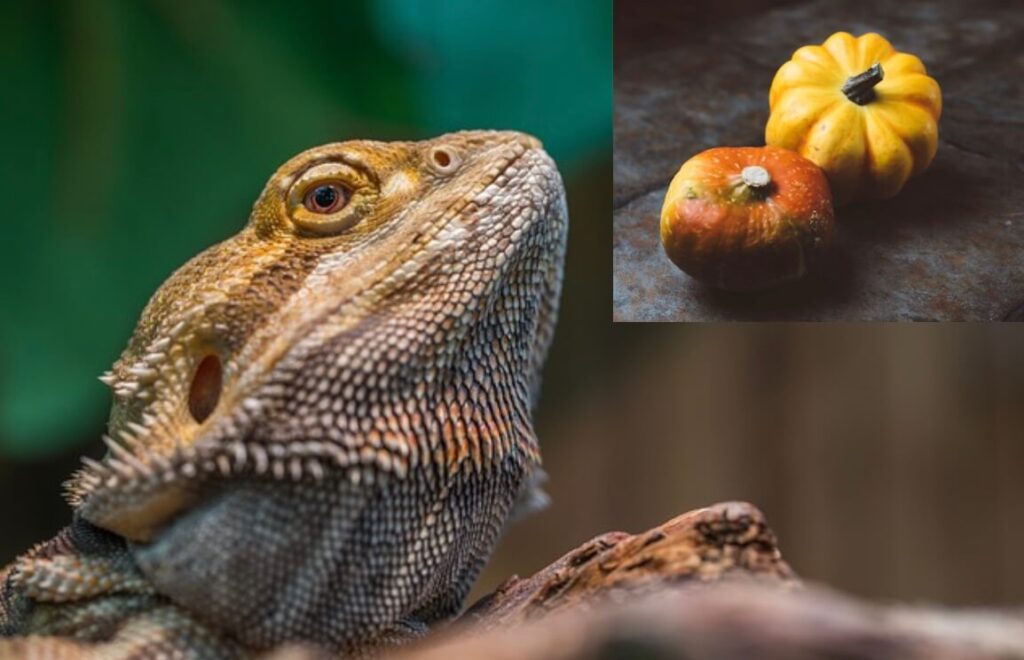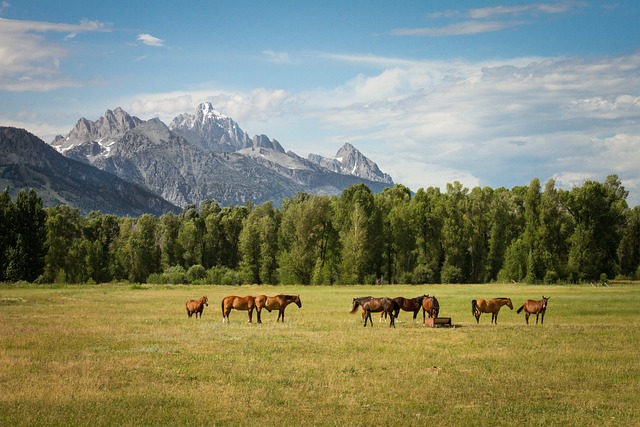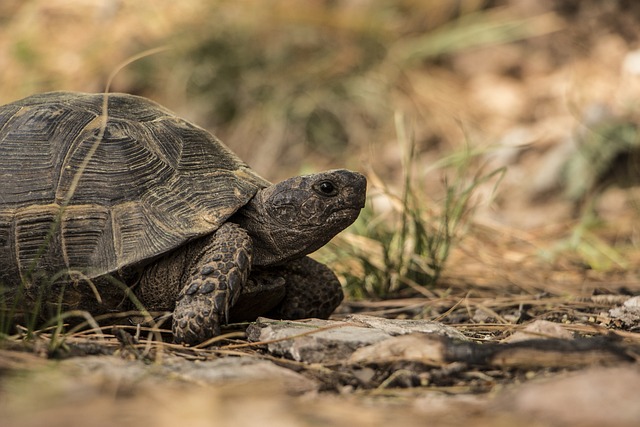Yes! If you’re wondering “Can bearded dragons eat acorn squash?” the answer is yes! Bearded dragons can eat acorn squash several times a week.
In this article, we’ll explore the nutritional value of acorn squash for bearded dragons and how to feed them properly. As well, see our full guide to What greens can bearded dragons eat?
Can bearded dragons eat acorn squash?
- Can bearded dragons eat acorn squash?
- Acorn Squash Nutritional Value for Bearded Dragons:
- How often should you give acorn squash to your beardie?
- How do I prepare acorn squash for my bearded dragon?
- Potential risks of feeding acorn squash to your bearded dragon:
- Frequently Asked Questions (FAQ): Can bearded dragons eat acorn squash?
- What kind of squash does the bearded dragon eat?
- Can bearded dragons eat pumpkin squash?
- Can bearded dragons eat butternut squash? Can bearded dragons eat butternut squash daily?
- Can bearded dragons eat squash skin?
- Can bearded dragons eat zucchini?
- Can bearded dragons eat spaghetti squash?
- Can bearded dragons eat butternut squash skin?
- Can beardies have sweet potatoes?
- Can bearded dragons have cheese?
- Foods bearded dragons can eat:
- Getting your bearded dragon calcium:
- Vegetables to feed your bearded dragon:
- Insects to feed your bearded dragon:
- How often should you feed a bearded dragon?
- What should a bearded dragon not eat?
- Recap: Can bearded dragons have acorn squash?
Acorn Squash Nutritional Value for Bearded Dragons:
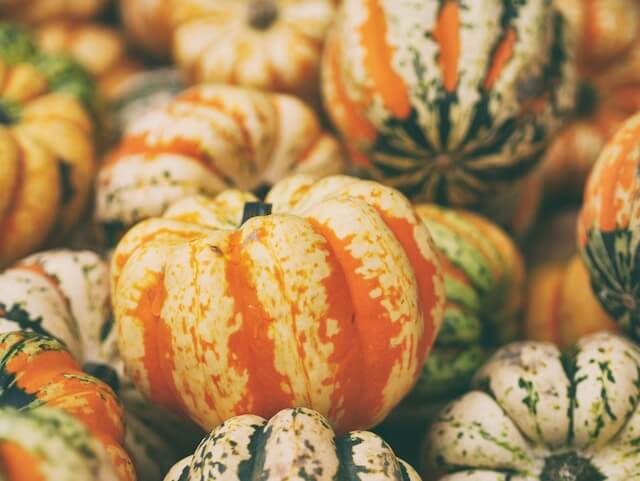
Acorn squash is a wonderful source of nutrients including:
- Vitamin A
- Vitamin C
- Fiber (great for bearded dragon’s digestion)
- Calcium (vital for beardie’s growth and bone health)
- Copper
- Iron
- Magnesium
- Manganese
- Potassium
- Protein
- Carbohydrates
Source: Web MD
Acorn squash has a calcium to phosphorus ratio of about 1:1. While this isn’t the ideal ratio you want, it’s not bad. In bearded dragons, it’s important to be aware of the phosphorus and calcium content in food you feed them. Why? Bearded dragons need a good amount of calcium to grow and to maintain bone and muscle health in adulthood. However, phosphorus inhibits the absorption of calcium if there’s too much of it, relative to the calcium amount.
You should aim for a 2:1 ratio of 2 parts calcium to 1 part phosphorus. We’ve outlined ways to increase your beardie’s calcium intake below as well.
How often should you give acorn squash to your beardie?
You can safely give your beardie acorn squash 2-3 times a week. Cut up a sliver about the size of your thumb.
Note: because of acorn squash’s calcium to phosphorus ratio, it’s important to feed them other leafy greens that have more calcium. To be safe, you can also sprinkle calcium powder on your squash to ensure your bearded dragon is getting enough calcium.
How do I prepare acorn squash for my bearded dragon?
You can feed your acorn squash to your dragon, cooked or raw. The skin is fine for them to eat, and actually is full of nutrients and antioxidants. If you cook the squash to your bearded dragon, it does lose some of its nutritional value.
Make sure to cut your squash into slivers and small chunks, so your bearded dragon doesn’t choke on it.
Sprinkle the smaller chunks into your bearded dragon’s food bowl. If they have leftovers, remove them after 24 hours or when it starts to go off.
Potential risks of feeding acorn squash to your bearded dragon:
Acorn squash doesn’t have the ideal ratio of calcium to phosphorus, and it is also carb heavy. That’s why we recommend you feed your beardie this vegetable a few times a week, and mix it in with other greens.
If you were to only feed your beardie acorn squash daily with no other vegetables, they would suffer from a calcium deficiency and over time, it would harm their bone and muscle health.
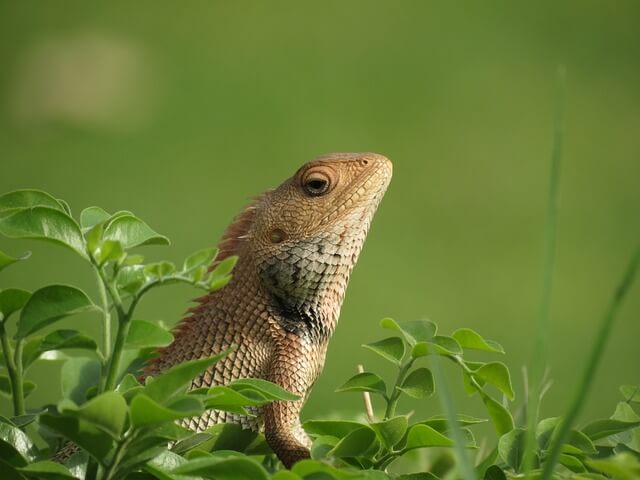
Frequently Asked Questions (FAQ): Can bearded dragons eat acorn squash?
What kind of squash does the bearded dragon eat?
The technical name for squash, Cucurbita, includes acorn squash, pumpkin, butternut squash, summer squash, winter squash, delicata squash, kabocha squash, sweet dumpling squash, sugar pumpkin, carnival squash, yellow squash, and many more. Happily, bearded dragons can eat all varieties of squash and they each provide nutritional value to them.
Can bearded dragons eat pumpkin squash?
Yes, bearded dragons can eat pumpkin every week or so.
Can bearded dragons eat butternut squash? Can bearded dragons eat butternut squash daily?
Yes, bearded dragons can eat butternut squash, multiple times a week or even daily.
Can bearded dragons eat squash skin?
Bearded dragons can eat squash skin. It’s healthy and packed with nutrients for them.
Can bearded dragons eat zucchini?
Beardies can eat zucchini, in moderation. Give them uncooked zucchini every other week or so as a treat.
Can bearded dragons eat spaghetti squash?
Yes, bearded dragons can eat spaghetti squash. They can even eat a small amount daily.
Can bearded dragons eat butternut squash skin?
Yes, bearded dragons can safely eat butternut squash skin. It’s healthy and full of antioxidants that are great for their overall health.
Can beardies have sweet potatoes?
Beardies can eat sweet potatoes as an occasional treat. While they provide nutritional value to them and bearded dragons love the taste, they shouldn’t be eaten daily due to their relatively high sugar and carbohydrate levels.
Can bearded dragons have cheese?
No, bearded dragons should not eat cheese or dairy or any kind. See our guide to bearded dragons eating cheese here.
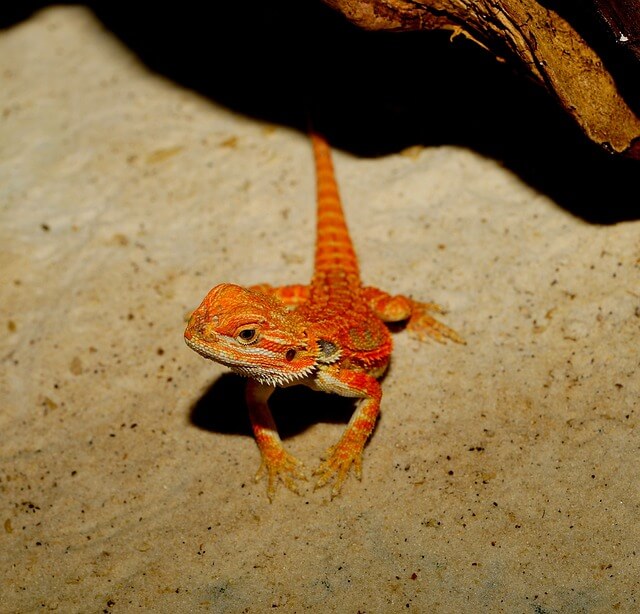
Foods bearded dragons can eat:
If you’re wondering what you should feed a bearded dragon, read our guidelines below. Bearded dragons are insectivores, which just means they thrive on insects as well as plant materials.
If you have a juvenile bearded dragon (between six and eighteen months old), give them about 80% vegetables and 20% live insects.
As your bearded dragon transitions into adulthood, give them the inverse, so 20% plant materials and 80% insects.
Getting your bearded dragon calcium:
Calcium is especially vital to a bearded dragon, especially a young one that is still growing. There are several ways to introduce more calcium into your beardie’s diet:
- Add in more high calcium vegetables like dandelions, bok choy, and collard greens.
- Dust calcium powder over their insects and vegetables to increase calcium levels.
- Make sure they’re getting their 12 hours of UVB exposure as they need this light to be able to properly absorb nutrients.
Vegetables to feed your bearded dragon:
- Peas
- Dandelion
- Green beans
- Cabbage
- Zucchini
- Pumpkin
- See our full list of vegetables to feed your bearded dragon
Note: Bearded dragons can also eat fruit in moderation. See here for a complete list of fruits bearded dragons can eat.
Insects to feed your bearded dragon:
- Crickets
- Kingworms
- Waxworms
- See our full guides to insects you can feed your bearded dragon and worms to feed your bearded dragon
Quick note: Live insects raised by you or bought from the pet store are best because they’re definitely pesticide free.
How often should you feed a bearded dragon?
During the first 3-6 months of your beardie’s life, try to feed them four to five times a day by giving them as many insects as they’d like in 10 minutes. They’re growing and need lots of protein during this stage.
Reduce the number of feedings to about two to three times a day when they’re growing into their juvenile years (between six and eighteen months).
As they become an adult, you can feed them once daily.
What should a bearded dragon not eat?
Avoid feeding your bearded dragon:
- Onions
- Leeks
- Chives
- Mushrooms
- Garlic
- Acidic fruit like oranges, lemons
- Rhubarb (can be toxic to them)
- Avocados (surprisingly, these make them ill)
- Eggplant
- Insects caught in the wild (there may be pesticides covering them)
- Venomous insects
- Dairy of any kind
- Rice and grains of any kind
- Frogs or toads
- Ham or other processed meats
Recap: Can bearded dragons have acorn squash?
- Yes, bearded dragons can eat acorn squash, and they enjoy it.
- Feed them this vegetable a few times a week, mixed in with leafy greens.
- You can sprinkle calcium powder on top of your acorn squash to boost your dragon’s calcium intake.
- Cut up a thumb sized piece of acorn squash (cooked or raw) and mix the pieces into your beardie’s vegetable mix.
For our full list of food to feed a bearded dragon, see our guide here.
Related articles:

